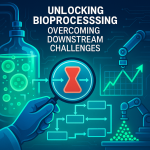📈 By controlling oxygen levels in bioreactors, scientists significantly increased hepatocyte-like cell (HLC) production.
🔍 Their findings suggest 4% oxygen concentration resulted in threefold more HLCs and improved functionality.
👩🔬 Future research will focus on enhancing HLC maturation for better treatment development.
Introduction:
The article discusses innovative research aimed at improving the production of hepatocyte-like cells (HLCs) from human induced pluripotent stem cells (iPSCs) to better model liver disease and facilitate the development of new therapies. The focus is on the impact of dissolved oxygen concentration during cell cultivation in bioreactors.
- The use of human iPSCs to generate HLCs as models for studying liver disease is challenged by low production rates.
- Researchers, led by Margarida Serra, investigated the effects of varying dissolved oxygen (DO) concentrations, comparing atmospheric levels (21%) to physiological levels (4%).
- The study found that a 4% DO environment significantly increased HLC production and differentiation of hepatic progenitor cells compared to 21% DO.
- Functional analyses demonstrated that HLCs produced at 4% DO exhibited key hepatocyte characteristics, including drug metabolism and synthesis of hepatic metabolites.
- The research indicates that controlling DO in bioreactors could enhance the modeling of liver disease, though further work is needed to improve HLC maturation for therapeutic applications.
Conclusion:
The findings of this study underscore the importance of oxygen control in bioreactor settings to optimize HLC generation from iPSCs, which may accelerate therapeutic advancements for liver diseases. Future research is essential to refine the maturation processes of these cells to fulfill the requirements for in vivo applications.



